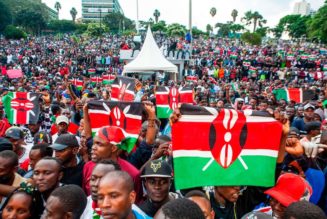Columnists
What Kenya can learn from DRC in stabilising education in North Rift
Thursday June 29 2023
Students at St Benedict’s Arror Girls Secondary School in Kerio Valley, Elgeyo Marakwet County on January 20, 2022. Cattle rustlers from the neighbouring community attacked the area and stole animals, barely 100 metres from the school compound. PHOTO | JARED NYATAYA | NMG
When President William Ruto came to power last year, ending insecurity and cattle rustling in the bandit-troubled North Rift region of the country topped his priority list and a heavy security deployment was consequently witnessed.
But, how best to restore education remains the biggest question.
The government mobilised resources for the reconstruction of schools. At Kapedo Mixed Secondary School, masons are renovating six classrooms that were destroyed by bandits resulting in its closure and the integration of learners in another school.
Such is replicated in Chesitet, Baringo County and Chepkesin, Elgeyo Marakwet County.
For these efforts to bring sustainable change, we need to move beyond brick and mortar and address pedagogy in a crisis context, create integrated schools, and pursue community forgiveness.
The Democratic Republic of Congo (DRC) offers a few learning points. The decade-old conflict in the DRC began when a faction of the Congolese army mutinied and formed the M23 rebel group, particularly in North Kivu Province, which borders Rwanda and Uganda.
In Sake Province of the DRC, multi-agency collaborative efforts have led to the training of teachers on trauma-informed teaching methods and psychosocial support for students to make the resumption of learning meaningful.
Additionally, peacebuilding and reconciliation among various stakeholders have been intensified. The government aims to address the root causes of the conflict and create a conducive environment for the resumption of education and other social services through such initiatives.
In Kenya, the government continues to blame faceless financiers for making the conflicts and cattle rustling harder to end, causing a surge in the number of out-of-school children.
Conflict thrives in segregation. The National Council for Nomadic Education in Kenya (NACONEK), must establish integrated schools in selected regions and deliberately use them to create environments that integrate communities with distinct cultural and even religious differences and nurture their joint interests.
In a multi-ethnic region, foregrounding sub-county schools that largely serve distinct communities entrenches cultural segregation further.
According to a Global Education Monitoring report, it is important to engender resilience in students and communities in post-conflict through integrated schools.
Such residential schools create a sense of forgiveness, with the potential to heal historical divisions. Members of the community whose children are educated together may develop more tolerance towards each other.
We must spin the war in the North Rift in favour of children. They must win and the focus must be education stability.
Vichei is an education in emergencies expert currently working in the DRC.
Onunga is an educator.









